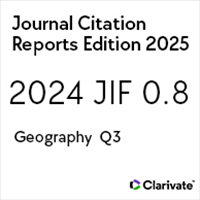Población, sociedad y salud en la frontera argentino–paraguaya
Población, sociedad y salud en la frontera argentino–paraguaya
Palabras clave:
Economía, político, limite internacional, decisión política, cultura, fronteraCitas
Añorve, Daniel (2008), “La evolución del concepto 'frontera' dentro del desarrollo capitalista”, Pensares y Quehaceres, núm. 6, marzo, pp. 81-95.
_____ (2007), La evolución histórica del concepto 'frontera' dentro del desarrollo capitalista: Rusia, ¿nueva frontera capitalista?, tesis doctoral en Relaciones Internacionales, Facultad de Ciencias Políticas y Sociales, UNAM, México.
Azeri Press Agency (2009), “Russia’s New National Security Conception: Political Forecasting or Kremlin’s plans”, 9 de febrero. Ver http://en.apa.az/print. php?id=96760 (Fecha de consulta: 18 de septiembre de 2009).
“Putin Doctrine: Immediate Threat to Belarus”, Belarusian Review, Ver http://www.belreview.cz/articles/2682.html (Fecha de consulta 18 de septiembre de 2009).
Blair, David (2009), “Why the Restless Chinese are Warming to Russia’s Frozen East”, Telegraph, 16 de julio. Ver http://www.telegraph.co.uk/comment/5845646/Why-the-restless-Chinese-are-warming-to-Russias-frozen-east.html (Fecha de consulta: 24 de mayo de 2010).
Brazelton, Hallet (2004), “The Nature of Russian Federalism and the Impact of Nationalisms”, Universidad Central de Europa, Budapest.
Consejo de Seguridad de la Federación Rusa (1996), “Fundamentals of Russian Federation Border Policy” (Ratificada por Boris Yeltsin, presidente y jefe del Consejo de Seguridad de la Federación Rusa, el 5 de octubre de 1996). Ver http://www.fas.org/irp/world/russia/docs/border_policy.htm (Fecha de consulta:
de septiembre de 2009).
Cuttitta, Paolo (2009), “Puntos y líneas: una topografía de las fronteras en el espacio global”, en Nattie Gloubov y Rodrigo Parrini (eds.), Los contornos del mundo: globalización, subjetividad y cultura, UNAM; CISAN, México.
Chandler, Andrea (1998), Institutions of Isolation: Border Controls in the Soviet Union and its Sucesor Status, 1917-1993, McGill-Queen’s University Press, Montreal.
“Medvédev crea distrito federal del Cáucaso Norte para sacar región del atraso”, Diario Moscú, 20 de enero de 2010. Ver http://www.diariomoscu.com/__n1121734__Medvedev_crea_distrito_federal_del_Caucaso_Norte_para_
sacar_region_del_atraso.html (Fecha de consulta: 23 de mayo de 2010).
Dunlop, James (1993), The Rise of Russia and the Fall of the Soviet Empire, Princeton University Press, Princeton, NJ.
Dunn, J.R (2008), “Rollback Russian Expansionism”, 26 de agosto. Ver, http://www.americanthinker.com/2008/08/how_to_rollback_russia.html (Fecha de consulta:23 de septiembre de 2008).
East, Gordon (1951), “The New Frontiers of the Soviet Union”, Foreign Affaris, vol. 29, núm. 4, julio, pp. 591-607.
Economides, Michael (2006), “Russian Energy Imperialism”, Energy Tribune, 13 de septiembre. Ver http://www.energytribune.com/articles.cfm?aid=208&idli=3 (Fecha de consulta: el 24 de septiembre de 2009).
Economist Intelligence Unit (2001), Russia: Country Profile 2001.
Estrategia Nacional de Seguridad de la Federación Rusa, Strategiya natsionalnoi bezopasnosti RF gotova. Ver http://www.gzt.ru/politics/2009/04/29/222502.html.(Fecha de consulta: 28 de septiembre de 2009).
Febvre, Lucien (1962), “Frontière: le mot et la notion”, Pour une histoire à part entière. Sevpen, París.
Goble, Paul (2004), “Three Myths about Russian Federalism”, Russian Political Weekly. vol. 4, núm. 42, 27 de octubre.
Gutiérrez, Ana (2009), El fénix de Oriente: Rusia como potencia global en el siglo XXI, Montiel & Soriano Editores, Puebla, México.
Hewett, A. y Clifford G. Gaddy (eds.), Open for Business: Russia’s Return to the Global, The Brookings Institution, Washington, D.C.
Hirsch, Francine (2000), “Toward an Empire of Nations: Boder-making and the Formation of Soviet National Identities”, The Russian Review, vol. 59, núm. 2, abril, pp. 201-226.
Kalyoncu, Mehmet (2008), “In the Aftermath of Russian Invasionhow to Counter Resurrected Russian Expansionism”, Todays Zaman, 18 de agosto. Ver http://www.todayszaman.com/tz-web/detaylar.do?load=detay&link=150468 (Fecha de consulta: 18 de septiembre de 2009).
Karlin, Anatoly (2009), “The Myth of the Yellow Peril: Overhyping Chinese Migration into Russia”, Russia Blog, 1 de abril. Ver http://www.russiablog.org/2009/04/post_15.php (Fecha de consulta: 24 de mayo de 2010).
Klyuchevsky, Vassily (1993), Russkayia Istoryia. Polny Kurs Lektsii, Moscú, Mysl, Libro 1-3, vol.1, lectura 3.
Kucera, Joshua (2010), “China’s Russian Invasion”, The Diplomat, 19 de febrero. Ver http://the-diplomat.com/2010/02/19/china%E2%80%99s-russian-invasion/(Fecha de consulta: 24 de mayo de 2010).
Laurelle, Marlene (2009), “Russia’s Arctic Ambitions: Transforming the “Cost of Cold”, Policy Brief, núm. 7, Institute for Security & Development Policy, 9 de junio. Ver http://www.isdp.eu/files/publications/pb/09/ml09russiaarctic.pdf (Fecha de consulta: 26 de septiembre de 2009).
Lavrov, Sergei (2008), “Russian Foreign Policy and a New Quality of the Geopolitical Situation”, Anuario Diplomático. Ver http://www.mid.ru/brp_4.nsf/ itogi/BC2150E49DAD6A04C325752E0036E93F (Fecha de consulta: 26 de septiembre de 2009).
Luzhkov, Yuri (1999), “Russia in the Twenty-First Century: Prosperity or Stagnation?”, Problems of Economic Transition, vol. 42, núm. 3, julio.
Lynch, Dov (2002), “Separatist States and Post-Soviet Conflicts”, International Affairs, vol. 78, núm. 4, octubre, pp. 831-848.
McElroy, Damian (2008), “Georgia Conflict: Pro-Kremlin Enclaves Surround Russian Borders”, Telegraph, 9 de agosto. Ver http://www.telegraph.co.uk/news/worldnews/europe/georgia/2528971/Georgia-conflict-Pro-Kremlin-enclavessurround-Russian-borders.html (Fecha de consulta: 14 de septiembre de2009).
Nikitin, Alexander (2008), “Russian Foreign Policy in the Fragmented Post-sovietSpace”, International Jorunal on World Peace, vol. XXV, núm. 2, junio, pp.7-31.
Peca, Sutela (1998), The Road to the Russian Market Economy: Selected Essays, 1993- 1998, Kikimora Publications, Helsinki, 1998.
Penkova, Tomislava (2009), “National Security Strategy”. Ver documento del Istituto per gli Studi di Politica Internacionales: http://www.ispionline.it/it/documents/PB_144_2009.pdf (Fecha de consulta: 28 de septiembre de 2009). Pravda, Moscú, 8 de diciembre de 1988.
Rasizade, Alec (2009), “A Propos of the Georgian War: Reflections on Russia’s Revanchism in its Near Abroad”, Journal of Balkan and Near Eastern Studies, vol. 11, núm. 1, marzo, pp. 9-27.
Reynolds, Paul (2009), “New Russian World Order: The Five Principles”, BBC News Website. Ver http://news.bbc.co.uk/2/hi/europe/7591610.stm (Fecha de consulta 23 de septiembre de 2009).
Rossiiskaya Gazeta (1997), “Russian National Security Blueprint”, 26 de diciembre. Ver http://www.fas.org/nuke/guide/russia/doctrine/blueprint.html (Fecha de consulta 24 de mayo de 2010).
Ruble, Blair A. Jodi Koehn y Nancy E. Popson (eds.) (2002), Fragmented Space in the Russian Federation, Woodrow Wilson Center Press and John Hopkins, Washington, D.C.
Sakwa, Richard (2004), Putin: Russia’s Choice, Routledge, Nueva York.
Sánchez, Pablo y Ana Teresa Gutiérrez (2003), Rusia: Política Exterior y Conflicto Interno. De Mijail Gorbachov a Vladimir Putin, Quimera, México.
Security Index (2007), “What is China to Russia: Comrade or Master?” (serie de correos electrónicos entre Dmitri Trenin y Vitali Tsygichko), núm. 2(82), vol. 13, verano-otoño.
Shuster, Simon (2009), “Russian Troops Patrol Rebel Borders with Georgia”, El Economista (en español), 2 de mayo. Ver http://ecodiario.eleconomista.es/ internacional/noticias/1212924/05/09/Russian-troops-patrol-rebel-borderswith- Georgia.html (Fecha de consulta: 23 de septiembre de 2009).
Smirnyagin, Leonid (2001), “Federalism Putin Style or Putin’s Blow at Federalism?”, Briefing Paper of Program: Russian Domestic Politics and Political Institutions, Carnegie Endowment for International Peace,
Moskovskii Tzenter Carnegie.
Sopor, Vladimir (2008), “Annals of Russian Annexation”, Eurasia Daily Monitor, 5 de mayo. Ver http://larussophobe.wordpress.com/2008/05/05/annals-ofrussian-annexation/ (Fecha de consulta: 12 de septiembre de 2009).
Terliuk, Oleksandr (2009), “Has Russia begun the Crimea Annexation Campaign?”, The Day Weekly Digest, 15 de julio. Ver http://www.day.kiev.ua/276806 (Fecha de consulta: 13 de septiembre de 2009).
Thomas, Lorna (2008), “Russia and Europe Want a Multi-polar World”, 9 de diciembre. Ver http://www.globalpolitician.com/25307-russia-europe-unitedstates-foreign-policy (Fecha de consulta: 7 de septiembre de 2009).
Trenin, Dmitri (2009), “Russia: The Loneliness of an Aspiring Power Center”,enero. Ver http://library.fes.de/pdf-files/ipg/ipg-2009-2/2-09_a_trenin_us.pdf (Fecha de consulta: 18 de septiembre de 2009).
Trenin, Dmitri (2002), The End of Eurasia: Russia on the Borders between Geopolitics and Globalization, Carnegie Endowment for International Peace, Washington, D.C, y Moscú.
Valuev, Vasiliy (2000), “Globalization through Regionalization: The Case of Russia”, International Journal of Political Economy, vol. 30, núm. 3, otoño.



























